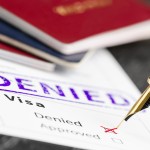Businesses in Ukraine flourish that say they can skirt the system and help get visas, residence permits, second citizenships and even honorary consulates, but just getting to travel to Europe for ordinary citizens is nothing short of an ordeal.
That ordeal can come at very unexpected times. Hennadiy Zvyahintsev, the art director of Smerechyna Folk Ensemble from a mountain town in western Ukraine said he got an invitation for the group to perform at North East England’s Billingham International Folklore Festival in the summer. He launched the visa process, confident of success because the troupe had traveled and performed in many countries, including Austria, Italy and Romania, all EU members.
But, he said, he was told there would be no visa when he went to the British Consulate in Kiev. Having paid for the trip, the group tried to persuade consulate officials that all 45 performers, young and old, had no intentions to stay in England and they showed consulate employees photos, videos and awards for past performances.
When nothing persuaded them to grant a visa, Smerechyna (Silver Fir Tree) performers tried a final tactic, performing in front of the Embassy’s doors. It had worked before, in 2007, when a children’s dance group performed for three hours in front of the French consulate and got their visas granted.
Silver Fir Tree dancers were not so lucky, even though he was invited inside. A man who, from behind a bullet-proof glass window, introduced himself as the consul, but said no.
Now, Zvyahintsev is less confident about the spring season, because having a UK refusal stamp in a passport raises suspicions at other consulates.
UK Ambassador Leigh Turner, however, did not share the doubts of his consular officer. In a special entry in his web-diary, he wrote about the incident, saying he had no doubts that the dancers were real performers but that the “system simply wouldn’t work if someone had the power to arbitrarily overturn [their] decision.”
A Pair of No-Comments
The Embassy’s press office refused any additional comment. And it also refused comment on another, quite different aspect of the visa process—a major consulting agency that makes things like visas happen for those with enough money.
The tough and often humiliating procedure that ordinary Ukrainians have to undergo to get visas provides a huge window of opportunity to the numerous consulting agencies that serve as intermediaries between applicants and the consulates.
When it comes to the UK visas, which the Smerechyna dancers were seeking on their own, one of the major agencies working in the field is UKvisa Consulting Group. It guarantees getting a UK visa for €200 more than the visa fee, regardless of the past visa history and it goes as far as promising to pay the money back in case of refusal. “We are operating only using legal consulting and organizational mechanisms and help those who have been refused visas, using our experience and connections”, claims the agency’s website, boasting of 7 years in the business, over 3,000 clients and “perfect knowledge of British bureaucracy system”.
After an experience calling the company, an Organized Crime and Corruption Reporting Project (OCCRP) reporter asked the Embassy about it and got a no-comment.
Here is what the no-comment was about. The company was asked about what it could do for a student who had been refused a visa because of the lack of a bank account with a balance or any income, but wanted to go to the UK for Christmas.
A UKvisa representative who gave his name as Roman responded that the company’s €242 package carried a 99.9 percent guarantee, if all necessary documents could be collected. The list of the documents required would be given only after the company got a non-refundable down payment of €42 Euros, a letter explaining the difficulties that the applicant had applying last time. The services also included a coaching session on how to act at the visa application center and an escort who would take the client to the entrance.
“Only the coroner can give a 100 percent guarantee”, said Roman when responding to doubts about the services.
UKvisa is only one of a number of agencies that specialize in helping to acquire Schengen visas. UKvisa charges from €170 for a single-entry visa from the Polish embassy to €1,400 for a 360-day multiple-entry visa from the Portugese Embassy. The company guarantees a positive result, without the client even having to visit the embassies or have an interview.
Who Are the Owners?
Who owns such firms? In some cases, they are owned by individuals from the other country, the country that would grant the visa. That was the case in a recent scandal implicating the Czech consulate in Lviv, where applicants had to pay approximately $17 to a call center company Jihomoravska provozni just to schedule an appointment at the consulate.
The company belonged to Czech citizen Vlastimil Valenta, who, according to the Czech news agency CTK, is an acquaintance of the Czech Ambassador to Ukraine, Jaroslav Basta, and was selected without a tender. It quotes Czech Television (CT) as reporting that 161 Ukrainians are presently demanding compensation from the Czech Republic for the compulsory phone registering. Five call centers operated at Czech diplomatic offices abroad, but only in Ukraine was the center administered by a Czech company. The Czech consul in Lviv, Jaroslav Hradil , left his post in February, shortly after the Czech Foreign Ministry cancelled the system of compulsory telephone registration.
Roman Skrepek, a spokesperson for the Czech Police Bureau for Detection of Corruption, said that while the police have not started an investigation in the case, as it has been reported in the media, he cannot exclude that one might begin soon.
--Vlad Lavrov, Korrespondent magazine


